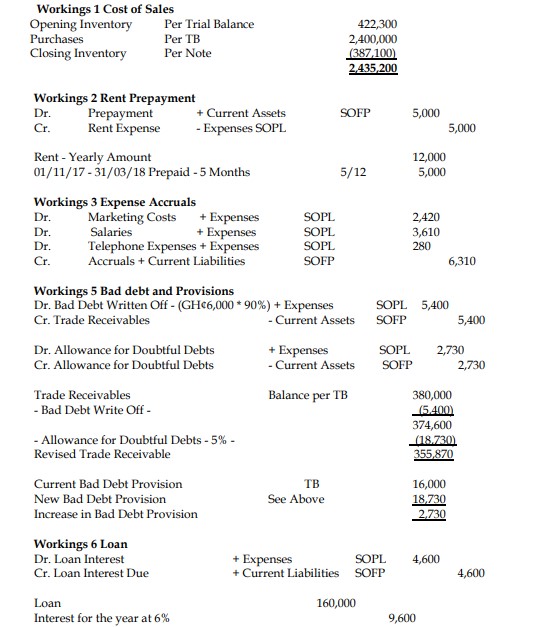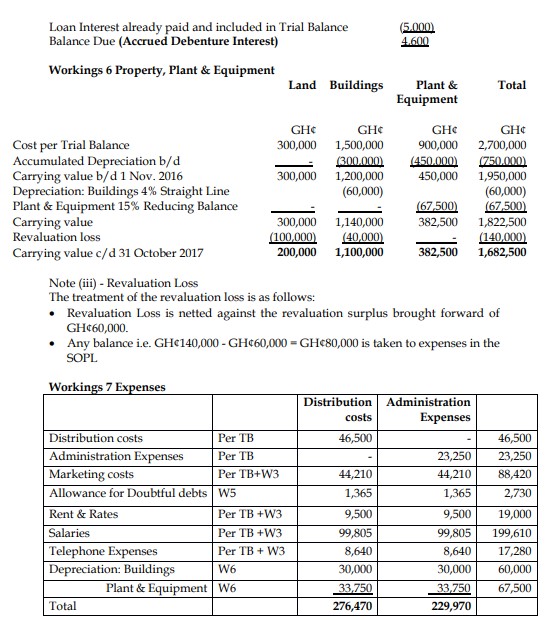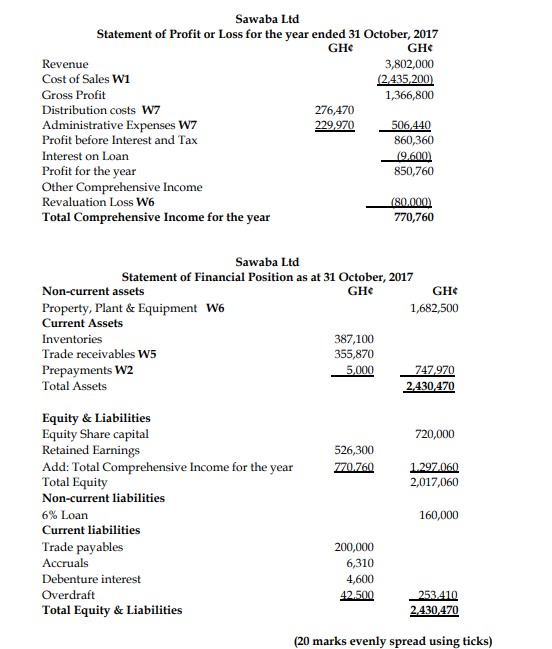- 20 Marks
Question
Adwoa Mansa is self-employed and has not filed her tax returns to the Ghana Revenue Authority. She applied for a tax clearance certificate in February 2023, and the head of her Tax Office insisted that she submit her accounts for the 2022 year of assessment. Below are the details from her auditors for the year ended 31 December 2022.
| Details | Amount (GH¢) |
|---|---|
| Gross Profit | 5,200,000 |
| Expenses: | |
| Utilities | 70,000 |
| Travelling expenses | 43,000 |
| Depreciation | 30,500 |
| Rent | 21,200 |
| Maintenance | 25,260 |
| Donations | 60,250 |
| Bad debts | 52,000 |
| Sanitation | 20,000 |
| Business promotion | 25,620 |
| Salaries | 86,000 |
| Net profit | 4,766,170 |
Additional Information from Adwoa Mansa in response to queries raised by the tax official:
- Utilities and Rent:
Adwoa Mansa and her husband occupy the apartment next to the shop. 25% of the expenditure on utilities and rent relates to her home. - Travelling Expenses:
28% of the travelling expenses were for private journeys. - Maintenance:
The maintenance figure includes GH¢11,500 for furniture and fittings bought for the shop and GH¢10,000 for painting her apartment. - Donations:
- Donation to Covid-19 fund: GH¢32,250
- Donation to Mallam Atta Women’s Association: GH¢19,500
- Donation to Farmers Day celebration: GH¢8,500
- Bad Debts:
- General provision: GH¢26,000
- Specific provision: GH¢10,000
- Loan to husband written off: GH¢16,000
- Sanitation:
GH¢1,000 was spent on acquiring equipment for cleaning the office premises. - Business Promotion:
- Permanent billboard: GH¢8,000
- Television advertisement: GH¢6,620
- Entertainment of customers: GH¢11,000
- Dividend and Interest:
Adwoa Mansa received a dividend of GH¢18,800 (net) from her investment with Tarzan Ltd and interest of GH¢15,600 from Government Treasury bills. These amounts were included in her gross profit. - Assets Purchased in 2022:
- Computers: GH¢300,000
- Warehouse: GH¢330,000
- Air conditioners: GH¢100,700
All assets are depreciable for capital allowance purposes.
Required:
a) State the circumstances under which bad debt will be allowable.
(4 marks)
b) Calculate the chargeable income of Adwoa Mansa for the 2022 year of assessment.
(16 marks)
Answer
a) Circumstances under which bad debt will be allowable:
- The bad debt must be specific, not general.
- The bad debt must have arisen in the ordinary course of business.
- The amount of the bad debt should have been included in income for previous years.
- Necessary steps should have been taken to recover the debt before it is classified as bad.
(4 marks)
b) Computation of Chargeable Income for Adwoa Mansa for the 2022 Assessment Year
| Details | GH¢ | Explanation |
|---|---|---|
| Net Profit per accounts | 4,766,170 | |
| Less: | ||
| Dividend (Tarzan Ltd) | (18,800) | Non-taxable |
| Interest (Government Treasury bills) | (15,600) | Non-taxable |
| Adjusted Net Profit | 4,731,770 | |
| Addbacks: | ||
| Utilities (25% personal use) | 17,500 | 25% relates to personal use |
| Depreciation | 30,500 | Non-deductible |
| Travelling expenses (28% personal use) | 12,040 | 28% relates to personal use |
| Rent (25% personal use) | 5,300 | 25% relates to personal use |
| Maintenance: Furniture & fittings (capital) | 11,500 | Capital expenditure |
| Maintenance: Painting (personal use) | 10,000 | Relates to personal use |
| Donations: Mallam Atta Women’s Association | 19,500 | Non-allowable donation |
| Bad debts: General provision | 26,000 | Non-allowable |
| Bad debts: Loan to husband | 16,000 | Non-allowable |
| Sanitation (equipment) | 1,000 | Non-allowable (capital expenditure) |
| Business Promotion: Permanent billboard | 8,000 | Non-allowable (capital expenditure) |
| Business Promotion: Entertainment of customers | 11,000 | Non-allowable |
| Total Addbacks | 168,340 | |
| Adjusted Net Profit | 4,900,110 | |
| Less: Capital Allowance | (176,440) | See working below |
| Chargeable Income | 4,723,670 |
Capital Allowance Calculation:
| Class | Cost (GH¢) | Capital Allowance Rate | Allowance (GH¢) |
|---|---|---|---|
| Class 1 | 300,000 | 40% | 120,000 |
| Class 3 | 113,200 | 20% | 22,640 |
| Class 4 | 338,000 | 10% | 33,800 |
| Total | 176,440 |
Total Capital Allowance: GH¢176,440
(16 marks)
- Tags: Bad Debt, Capital Allowance, chargeable income, Tax Deductibles
- Level: Level 2
- Topic: Income Tax Liabilities
- Series: MAR 2023
- Uploader: Joseph




